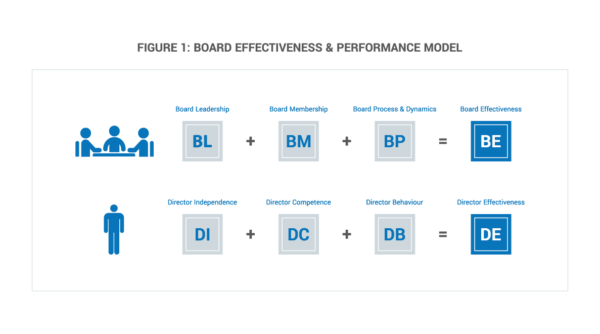The terms board effectiveness and board performance tended in the past to be associated with, and thought about solely in the context of the annual board evaluation – this is changing, but maybe not as quickly as it should as many boards continue to see the evaluation as a box-ticking exercise.
Yes, board evaluation is increasingly acknowledged as a vital process for improving board performance and dynamics whatever the size, status or type of organisation, but not when it’s only considered once a year.
When thoroughly conducted and embraced by a board, an independent and objective external board evaluation and performance programme establishes a strong foundation to assess the current strengths and weaknesses of the board and drive a measurable plan of sustained improvement. The word ‘sustained’ is critical in the context of this discussion as boards must strive to achieve continuing effectiveness and high performance, not just around annual review time so as to ‘tick the box’ but throughout recurring annual cycles.

We all know that evaluations can be conducted periodically by external independent organisations, not always with the quality or objectivity expected, or at intervals via an internally developed process which may or may not have some element of external facilitation. Whether the evaluation is external or internally driven, the company secretary is a vital resource in coordinating and driving the activity from inception of the process through to delivery of the final report, and in ensuring fulfilment of the plan of sustained improvement. They are typically the individual, working with the chair, who will take responsibility for production of questionnaires, compilation of responses and reporting on outcomes of internal reviews, and, in the case of external reviews, for bringing forward proposals for independent third party reviewers and supporting (hands-on) the retained third party in conducting the review, and in both cases, putting into practice and ensuring completion of agreed recommendations arising from the Board’s consideration of the review outputs.
So, board effectiveness and performance are not just about the annual evaluation and subsequent report, and this is where the company secretary steps up to the plate and helps to drive sustainableeffectiveness and performance in so many of the board’s activities, oftenwithout their efforts being recognised in that context.
So what is it that drives sustained board improvement? Well, boards that excel as highly effective and high-performing teams and deliver outstanding value to shareholders and stakeholders have typically achieved a blend of all of the following core features, namely:
- strong leadership in the form of an engaging, experienced and objective chair;
- board membership consisting of diverse and appropriately experienced directors, including non-executive directors who individually and collectively act with independence, intelligence (competence) and integrity (behaviour); and
- best in class board information management, processes and dynamics,
all underpinned by a strong trust-based partnership between executives and non-executive directors.

The company secretary plays a significant role in supporting the chair and the board in achieving and sustaining each of these features, and here’s how:
- they support the chair in achieving effective leadership of the board by being a valued adviser on promoting and sustaining the robustness and efficacy of corporate governance arrangements and practices, and by ensuring alignment of the board’s oversight focus with the company’s strategic priorities and governance considerations through proactive management of board and committee work programmes and agendas;
- they support the chair and the board in achieving the appropriate mix of diversity and experience on the board by assisting with skills and composition reviews to assist the board and committees in determining skills requirements and membership appropriate to their purpose and strategy, consequently facilitating related succession planning requirements, and by facilitating board evaluation and directors’ induction, development and training requirements;
- ensuring best in class board information management, processes and dynamicsis at the heart of the company secretary’s role and their influence in this regard is more obvious through many essential activities, including: (i) development and maintenance of work programmes to ensure alignment of board and committee meeting agendas and focus with strategic priorities and governance considerations,and engaging accordingly with the chair and CEO; (ii) facilitating and supporting the board and indeed the senior management team and their committees in functioning effectively and in accordance with their terms of reference and best practice; (iii) timely delivery of all meeting agendas and papers to all relevant forum members in accordance with approved templates and processes; (iv) ensuring all papers are written in a style which is concise, complete and coherent and which adequately reflects the substantive matters for consideration and the decisions or actions required of the particular forum; (v) accurate recording of meeting decisions and actions, and ensuring communication to owners and fulfilment where required; and (vi) timely delivery of quality, concise, complete and coherent minutes for approval and formal record-keeping to the chair following all meetings;
- and last but certainly not least, the company secretary can support the development of a trust-based partnership between executive and non-executive directors, and senior management, by encouraging an open, engaging and active dialogue between the Board and management and ensuring the circular and timely flow of relevant information between both constituents, and by organising informal social gatherings of the directors alone, and periodically directors and management around the board meetings where time spent on getting to know each other is time well spent and an investment in the effectiveness of the board – to quote a famous Greek philosopher, “you can discover more about a person in an hour of play than in a year of conversation”.
Returning to the theme of sustainability, it’s essential that the company secretary ensures the ongoing development of the company secretary team no matter how large or small, including succession planning for their own role, and individual members’ skills and experience so that they remain appropriate to the role, accountabilities and operations of the office, and are maintained in line with industry best practice and developments, to ensure continuous delivery of the requisite support and guidance to the organisation.
In summary, in today’s boardroom, attention is increasingly focussing on the ongoing effectiveness of the board and its capacity to continuously improve as a high performance team. A highly effective board of directors makes a significant contribution to the success of the organisation beyond its statutory requirements and is a powerful source of added value for the company, its customers, shareholders, directors, executives, employees and many other stakeholders.
And, of course, a significant component of a highly effective board is an equally effective and influential company secretary who, working closely with the chair, board teams and management, plays a critical and influential role in ensuring that the board excels on behalf of the shareholders and stakeholders.
David O’Callaghan is a Partner at Board Excellence, an engaging and objective specialist consultancy practice which enables boards, working as teams, and individual directors to excel in effectiveness, performance and corporate governance. We also work with company secretaries to assist them in shaping the structures and practices required to support the board in achieving excellence.
The views expressed in these articles are based on engagement and interaction with many company secretaries from many sectors over many years and are not reflective of any particular role or company.
Future articles in the series:
The Influential Company Secretary: Supporting alignment of the board’s focus with strategic and governance priorities;
The Influential Company Secretary: Making your board information management and processes fit for purpose;
The Influential Company Secretary: Influencing board composition, diversity and succession planning.
Other titles in the series will follow so please contact and let me know ( david@boardexcellence.ie ) if there are other topics in which you’re interested.
David O’Callaghan is a Partner at Board Excellence, a specialist board consultancy, advisory and training practice that supports boards of directors, working as teams, and individual directors to excel in effectiveness, performance and corporate governance best practices. We support boards in all company and business types across all sectors and of all sizes in Ireland and the UK.

